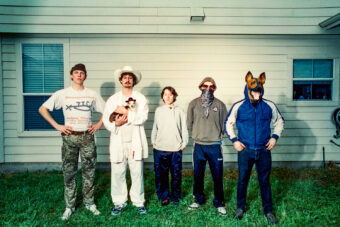Yesterday, Odd Future streamed Earl Sweatshirt’s long awaited second album, Doris, on their website. Here, six SPIN editors give their hasty and completely impulsive opinions…
Rob Harvilla:
For many a thirtysomething rock critic, the initial thrill of Odd Future was vicarious: Here’s what the kids are into; here, in fact, are the kids themselves. But every moment of pure joy they’ve experienced since is seemingly counterbalanced by hours upon hours of distinctly adolescent depression, rage, and loathing, self- and otherwise: Set aside six hours and trudge all the way through a Tyler, the Creator record if you’re unconvinced. It’s an unpleasant reminder that roughly 85 percent of your teenage years were/are pure misery, whether you make a quarter-million off of socks or not.
Which makes Doris an orgy of exquisite melancholy, of often deeply moving inertia. “Don’t nobody care about how you feel.” “I’m about to relish in this anguish.” “Sittin’ on a sofa feelin’ high and dormant.” “You not passionate about half the shit you into.” “I’m indecisive, I’m scatterbrained, and I’m frightened.” And Frank Ocean, of course, with the crowning touch: “What good is West Coast weather if you’re bipolar?” “Chum” in particular is enthralling and devastating, its details both universal (the mix of youthful vigor and vulnerability) and highly specific (grappling with both his father’s absence and Complex‘s unwanted presence). Is new best friend Mac Miller’s teenage-hedonist perma-pool-party compound an earthly paradise or the world’s most minimal-security prison? Revel in the sonic luxury here — the piano riff to “Whoa” alone — but don’t try this at home, especially if you already lived through it. Think twice before you try and will yourself back into a 19-year-old’s body.
Early score: 8/10
Christopher R. Weingarten:
There’s vomit on his sleeve already: “This is painfully honest and when I say it I vomit” and “Double scoop, hot vomit up, sub rocking” and so on — a purging that paints Doris as Earl’s version of Eminem’s Recovery after a career based being the only dude that stans for Eminem’s chainsaw massacre Relapse. But if he’s gonna do the witch house version of Mixboard Confessional, it would be a little more convincing if there was a little more Thebe on here. After slogging through all the guest spots, there’s maybe a 25-minute Earl Sweatshirt record — and fellow assonance enthusiast Ka already dropped a solid 39 minutes of mumblecore splatter-flick (save one Roc Marci detour). Between Doris, Ka’s The Night’s Gambit, Gunplay’s trickier moments, the R.A. the Rugged Man album you slept on, and the Kendrick Verse Tweeted Round the World, we’re once again entering a post-Em/B.I.G./G Rap era of appreciating internal rhymes like guitar solos. So, it doesn’t help that Mac Miller pulls off the most grabbing rhyme on this album: “Said this a hit of liquid heroin / Marilyn Manson channeling / Spar with Anakin ’til one of us leave in an ambulance.” Especially ’cause Mac Millers’s the Marilyn Manson to Earl’s Trent Reznor right now (for more NIN shenanigans, see the Jux-y ending of “Hoarse”). Welcome to the dope show?
Early score: 7/10
Jordan Sargent:
Internal turmoil — absentee fathers, mainly — has been an undercurrent of Odd Future’s music since the very beginning. But instead of being the focus, it was instead the crutch on which the crew’s blinding nihilism (the rape jokes, using “fag” as a grenade, all of it) leaned. That is until now: Earl Sweatshirt’s major label debut (the first one you can purchase IRL) is solemn and somber, one that slumps as much as it bumps, as he follows through on his promise that he’s no longer the kid who once wrote elaborate dead-cop fantasies. He deals mostly with the crush of pressure and the stress of fame, but his backstory here is a crucial one: as someone who was thrust into fame unwillingly while marooned on an island deep in the Pacific Ocean, his fixation on the changing circumstances of his life allow him to act as the splintered cog in the Internet hype cycle’s well-oiled machine. Doris is a mirror held up to what modernity hath wrought: a prodigiously talented rapper wrestling with all that happens after Internet gumshoes track you down.
Early score: 8/10
Chris Martins:
“Rawer than a skinned kneecap on a blacktop.” The Odd Future rhymer’s skills-over-everything approach is both his biggest gift and his only nominal flaw. While Tyler, the Creator falls all over himself to become a star provocateur (and succeeds), Earl Sweatshirt stays in his corner, a hoodie-up, head-down MC who mutters in staggering circles of gleeful wordplay and stoney rumination. Doris is a cornerstone-strong album whose woozy beatwork acts as the perfect airy buttress to all of those heavy bars, but by its own nature it’s no marquee event. The first tip-off is that the initial verse goes to an unknown entity named SK La’Flare (perhaps a future signing to Earl’s Tan Cressida imprint). And there are only four songs that don’t feature a guest — one of which (“523”) doesn’t even include Sweatshirt, while another (“Uncle Al”) is only 52 seconds long.
A closer listen, however, reveals that the 15-count track-list is misleading. With odd interludes and unexpected beat-shifts galore, Doris could be chopped up as many ways as old Earl’s theoretical murder victims — it’s a backpack rap smörgåsbord full of blunted DOOM-owing beats (the Pharrell-assisted “Burgundy”), warped 8-bit fantasies (“20 Wave Caps” with Domo Genesis), and lysergic soul snippets (“Molasses” with RZA) that deflect common knowledge about how rap songs should be structured. Still, we’re confronted with a troubling dichotomy indicative of our host’s mindset. The man’s words sound their best when he dons the maniac mask of yore, playing the leering degenerate on amped cuts like “Hive,” “Whoa,” or “Centurion.” But his lines are their most on-paper interesting when he’s quietly lurking the recesses of his own mind on less showy songs like “Chum” or “Sunday.” All of this said, a fascinating thing happens on “Hoarse” when both sides of the Sweatshirt fuse over a loping prairie dirge that finds the dude adopting a minor drawl. More of that, please.
Early score: 7/10
Brandon Soderberg:
Go back to those pre-ridiculously-famous videos of Odd Future goofing off and you’re often confronted with a very young Earl Sweatshirt, hovering in the background, annoyed and bored by the antics off his attention-seeking buddies. That’s his role in the group, it seems: To be slightly above it all. Sure, Earl’s mixtape, Earl, indulged the shock-jock, jerk-rap tactics of the group but it seemed so much more creatively open. It was also just, on a technical level, immaculately rapped. Doris, for the most part, a continuation of Earl’s closed circuit cypher aesthetic. It is a straight spitting, dudes hanging out and shooting the shit underground hip-hop record.
All of the perks of being a big deal rapper and not some mysterious youthful weirdo rapping in a barber’s chair hinder Doris. Why is a barely buzzing rapper like Vince Staples on three tracks? Why is Mac Miller on this thing at all? Tyler doing his gravel voiced grunt rap, shows up and mentions “dingleberries,” and pats himself on the back for an obviously ass Chris Brown and Rihanna joke on a song called “Sasquatch.” Towards the end of Doris, the RZA talks about fucking the freckles off your bitch. Really, now? Save for the confessional “Chum,” which finds a purpose for Earl’s in-point rapping, it’s a well-wrought rap verse from Frank Ocean that stands out as Doris‘ highlight.
Like most Odd Future releases, the feeling here moves very quickly from a reinvigorated sense of busted open boom-bap to an enervating one note, oppressive mess of breathless endless rapping and murky midtempo beats. You can’t fault Earl for making the album he totally wanted to make (though for how long do we give Odd Future credit for not progressing?), but he’s capable of so much more. Here’s a kid smarter than his friends, influenced by all of their worst qualities. The wizened teen side-eyeing his goofing around OFWGKTA pals has some new, more important but equally obnoxious friends, but he hasn’t grown up much at all.
Early score: 7/10
Philip Sherburne
Doris is desolate, disconsolate. “Ride dirty as the fucking sky that you’re praying to” — teenage kicks never sounded less fun. And you get the sense that Sweatshirt doesn’t have much use for fun. Blowing up is always a burden of one kind or another, but when you blow up in absentia, sent away by a mother who you know deep down has your back, no matter how pissed off you might be about it? And then you have to come back and step into the shoes that have been left waiting for you? That’s burden upon burden, as he spells out in “Burgundy” — “My priorities fucked up, I know it, I’m afraid I’m going to blow it / And when those expectations raising because daddy was a poet, right?” And while the song rises to a sense of self-actualized purpose (“And for the time being I’mma be that nigga, believe that nigga”), it’s the rare moment on the album that doesn’t feel shot through with self-doubt. “Something sinister to it,” begins “Chum,” a brokenhearted Bildungsroman whose title might be about friendship or bloody bait in the water, maybe both. Fast-forwarding through his childhood and young adolescence, the rise of Odd Future and the antics that got him carted off, he hones in on Complex, who tracked him down in Samoa, kicking up the “Free Earl Sweatshirt” campaign a notch (and leading to a lot of internet commenters calling his mom things like a “retard” and worse), and addresses them directly:
“Supposed to be grateful, right?
Like, ‘Thanks so much, you made my life
Harder, and the ties between my mom and I are strained and tightened
Even more than they were before all of this shit’
Been back a week and I already feel like calling it quits.”
In its tarnished sonics and red-eyed brooding, Doris feels like an extended riff on Ghost Dog — both RZA’s soundtrack and also the whole film as a meditation on solitude and honor. (It’s ironic, too, because Ka’s The Night’s Gambit is another new album heavily under the influence of the 1999 film, from the insomniac mood and minor-key riffs and chess metaphor to the fact that Ka’s gravelly whisper actually sounds a lot like Forest Whittaker’s deadened purr; Earl’s voice, meanwhile, sounds not unlike we might imagine a teenaged version of Ka’s voice, before middle age had sanded down all the rough edges.) The underwater church organs and lead-booted lurch of the Samiyam-produced “20 Wave Caps” lead straight back to RZA’s “Fast Shadow” (which is even in the same key) and “Samurai Showdown.” The opening “Pre” is coldwave crunk rather than Satie-gone-samurai boom-bap, but damned if it doesn’t also sound uncannily like the soundtrack’s first track, “Ghost Dog Theme (w/ Dogs & EFX).” (Aside from the off-time beats, it layers perfectly under “Pre,” in fact — pull up a YouTube window and try it yourself.)
And however you want to read them, the final three tracks are flat-out stunning. Tyer, the Creator’s “Whoa” beat sounds like Wu-Tang via Moodymann, all mosquito Moog leads and zombie moan and stray jazz piano. “Hoarse” is on some Morricone/Forest Swords/Tricky tip, with a little bit of the Cure’s Pornography mixed in for good measure, while the closing “Knight” finds a glimmer of hope in druggy doo-wop choruses and vinyl-braking effects: “Young, black, and jaded / Vision hazy, strolling through the night.” It’s good to have you back, Earl. Maybe look into keeping pigeons or something — stay jaded, but stay grounded. We need you.
Early score: 8/10
AVERAGE SCORE: 7.5





